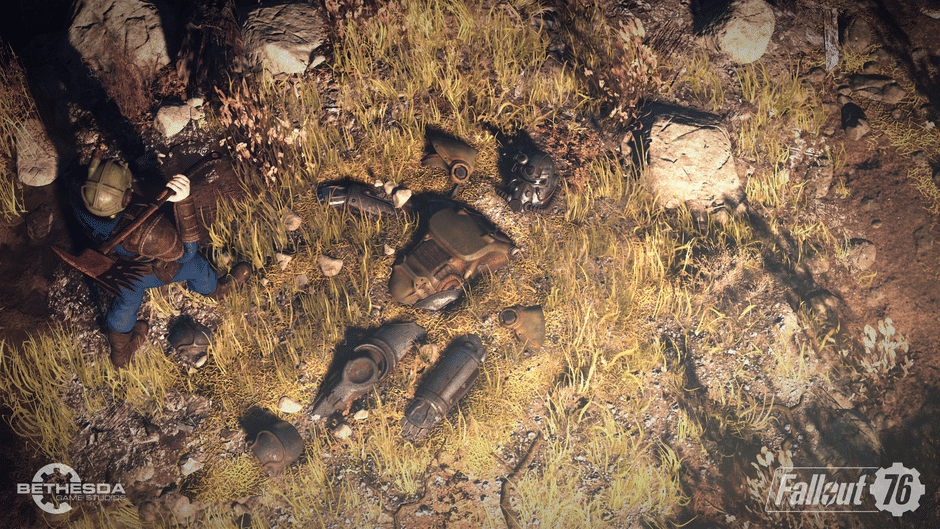
When Bethesda first teased Fallout 76 earlier this year, people were absolutely thrilled. A new Fallout game within just three years of a mainline title? Unheard of. Was this a follow up to Fallout 4 or a project by an external developer, like Fallout: New Vegas? But then the game was announced. An online, multiplayer-only version of the Fallout experience. While some fans were excited by this dramatic change to the format, there were many others who suddenly found themselves very wary of it.
Before we go any further, let’s build some context and quickly reflect on Fallout 4.
Fallout 4 was a successful addition to the franchise, streamlining the existing Fallout template by giving the visuals a once-over and making the shooting mechanics more fluid and engaging, like a contemporary FPS. For this, it proudly counts numerous ‘Game of the Year’ awards among its accolades. Fallout 4 was also a crowd pleaser as far as active environments went, with the ability to construct bases through the innovative ‘settlement’ system. Settlements were popular enough that they will be making their return in Fallout 76, with players able to build anywhere they desire.
But Fallout 4 also generated a wealth of controversy on release. The fan following the series had amassed leading up to Fallout 4 was comprised not of casual gamers, but of people who had sunk their teeth deep into the RPG mechanics of the earlier games. Further, a sizeable contingent of Fallout’s community make their home at a website called Nexus Mods, a hub dedicated to the modifying of existing games, built on community collaboration, involvement, and a whole heap of bug fixing.
Fallout 4 was also the first game to incorporate Bethesda’s Creation Club, which was a revival of the controversial joint-venture between Valve and Bethesda eventually dubbed ‘Paid Mods’. Many of the Paid Mods initiative’s critics had pushed back against the idea of paying for mods, given that they had always been made freely available by fans, for fans. The Community backlash had been significant and, not wanting to endure more of it, Bethesda scrapped the Paid Mods initiative two days after its announcement, and took a further three years to think of a way around it. Creation Club sought to make mods into something more substantial — ‘mini-dlc’, a term valiantly coined by Bethesda’s Senior Vice President of Marketing and Communications Pete Hines. Though Bethesda insists the mods are not “paid,” users do have to exchange Credits for Creation Club mods and those Credits are purchased with real money via the PlayStation, Xbox and Steam storefronts. So, yeah, Bethesda got their paid mods in the end.
So. Mods are very important to the community. With all of that history established, let’s move on to 76. From the outset, Fallout 76 appears to tackle a number of the community’s biggest criticisms of Fallout 4. It seeks to completely remove the dialogue system, for instance, but it has been said to not have mod support ‘on launch’ which may create further problems down the line.
In terms of the narratives and the lore that Fallout explores, being able to visibly change the universe around you through your allegiances, your opinions and your chosen play-style is something I long for in an RPG. I don’t see Fallout 76 giving me that kind of depth. It looks as though the new title will also be removing NPCs you can interact with as well, which is unfortunate.
All of these things concern me. But the lack of mod support. That’s a killer. The New Vegas section of Nexus Mods is home to some of the best mods ever created. For them to have been ingrained in the fabric of the series for so long and to have to let them go — it’s a real shame.
But, as stated earlier in this piece, there is a difference between previous Fallout titles and Fallout 76. The new title will be multiplayer-centric, with players able to team up with or against each other whilst exploring the irradiated ruins of West Virginia.
That should be a worry for modders. Triple A games aren’t too open to multiplayer modding. Players who mod in Grand Theft Auto V receive prompt GTA Online bans if they choose to enter the online mode. It wouldn’t surprise me to see Fallout 76 players copping similar bans to avoid giving anyone an advantage.
Bethesda have said that players can choose to eschew the multiplayer and play solo. But the word is solo, not offline. This does mean that Bethesda could keep mods out of their game with a single, hard barrier.
My concerns for the franchise are that players should feel challenged and immersed in a Fallout game, with the ability to have an impact on the world around them. Bethesda have shown that they’re willing to streamline the experience by removing features and aspects of the universe, crafting it into a less player-based experience and more of an environment-based experienced.
This makes me sound nostalgic for New Vegas, but I’ll justify it; there’s other RPG’s on the market, and I’m not sure if I want to play a multiplayer Fallout. The Witcher 3 was a terrific game, Assassin’s Creed Odyssey is going down the RPG route, Cyberpunk 2077 is coming soon, and hey, here’s probably the reason for Fallout‘s drastic change of direction — so is The Elder Scrolls VI.
Maybe it’s in Bethesda’s best interests to move Fallout away from being a single-player RPG, leaving The Elder Scrolls the dominant figure of the category, removing potential sales competition between the two properties. Hey, they did it with Wolfenstein and DOOM. They’re drastically different games now, with Wolfenstein pursuing a narrative-based direction and DOOM being intensely action based. Even the newer Quake: Champions follows suit, being completely multiplayer.
I guess we’ll see how it turns out come November.
Fallout 76 launches November 14th on PlayStation 4, Xbox One and Windows PC.
